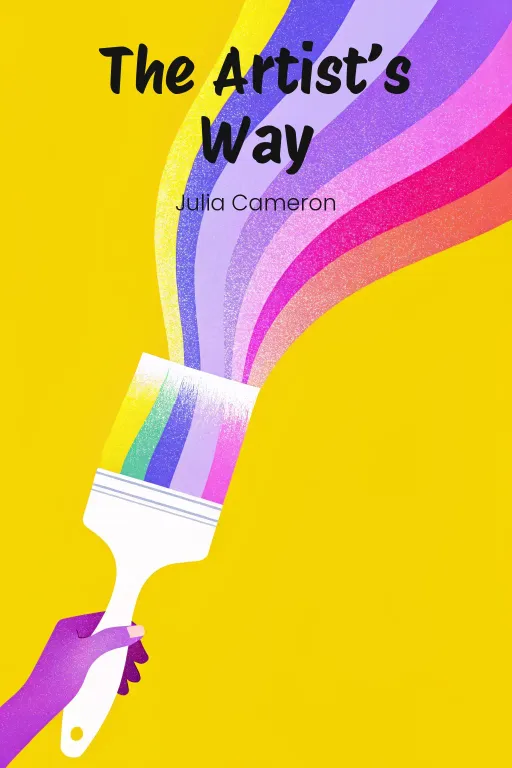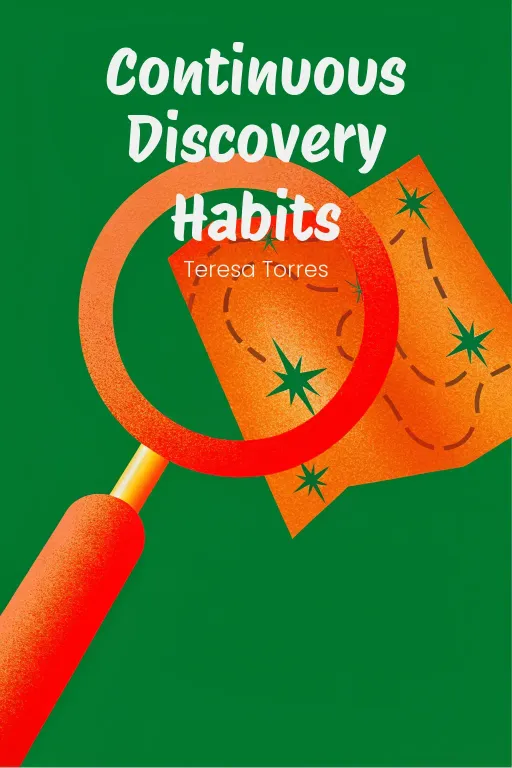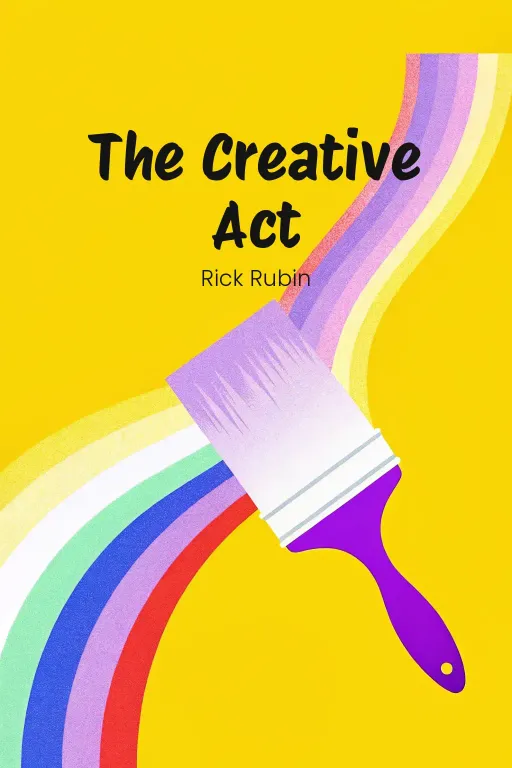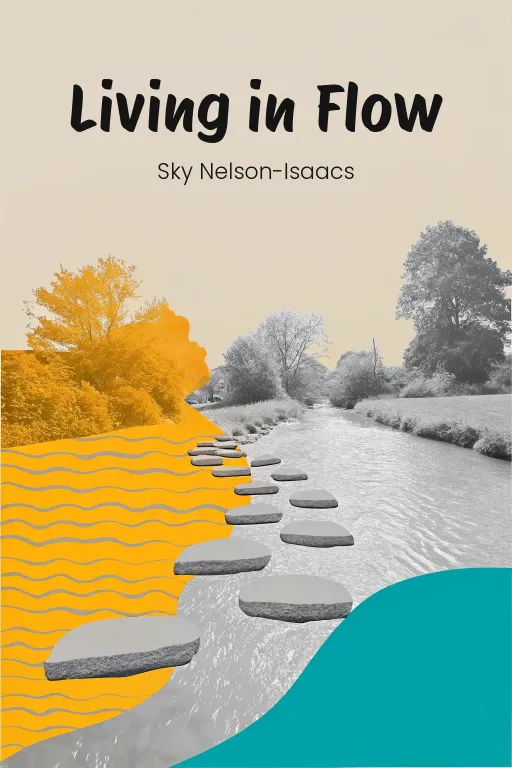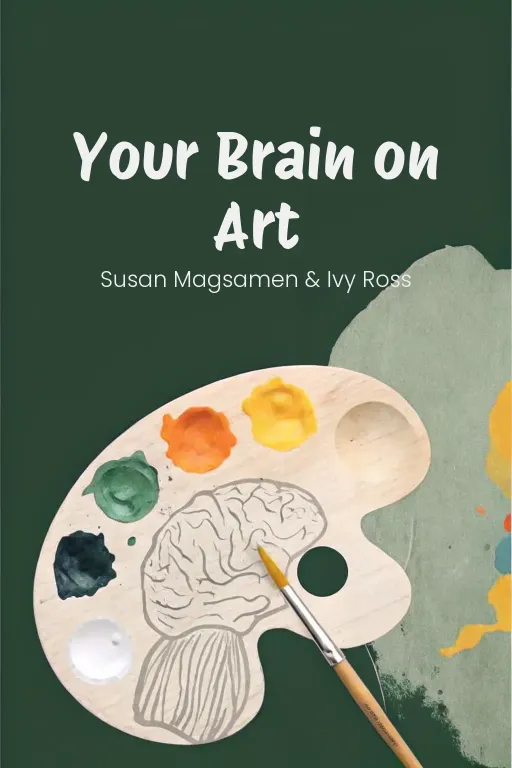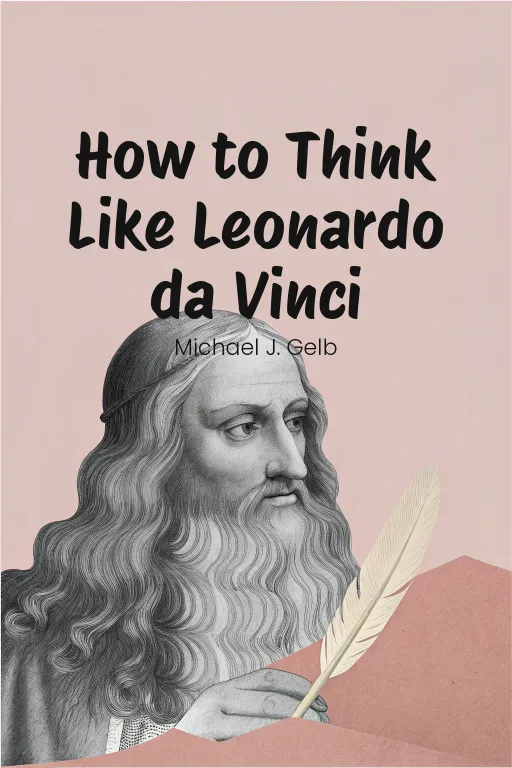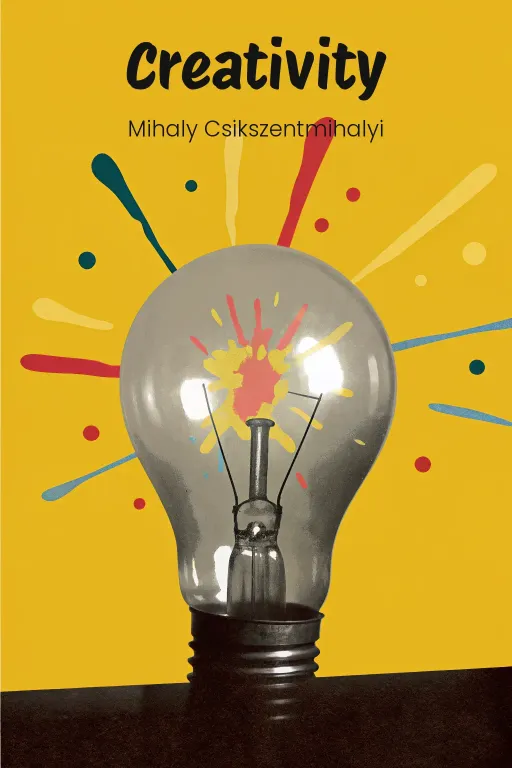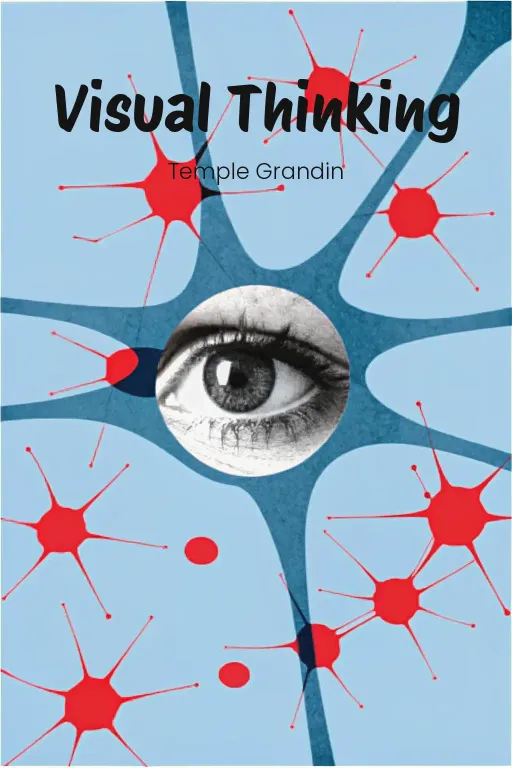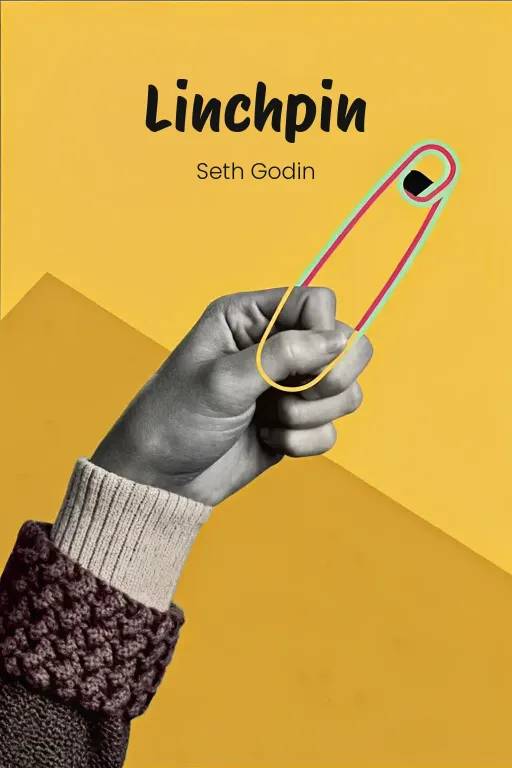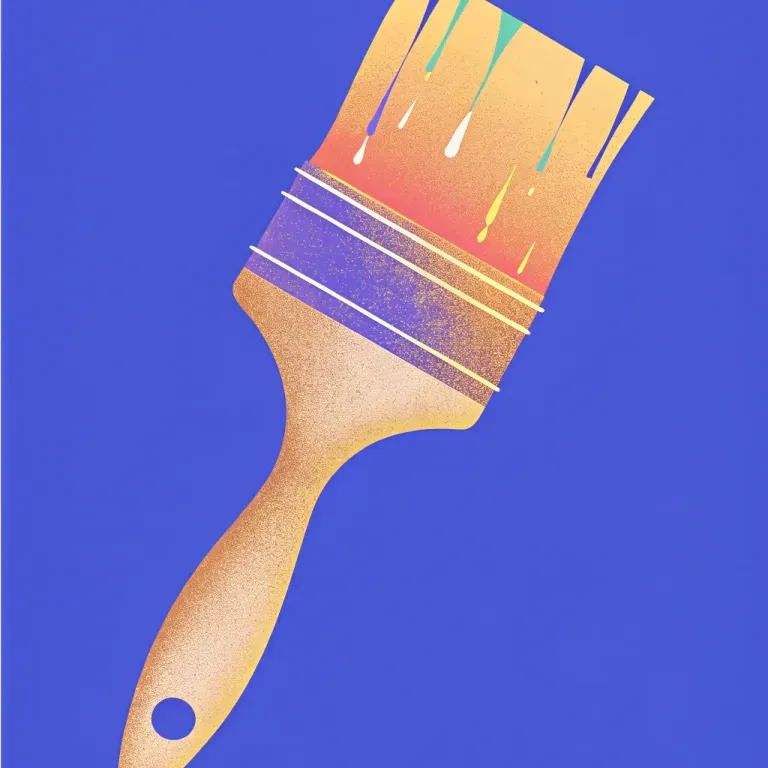
Find Your Creative Flow
Podcast by Chasing Sparks with Alex and Justine
A Spiritual Path to Higher Creativity
Introduction
Part 1
Alex: Hey everyone, welcome back! Today we're diving into unlocking that creativity that most of us have, even if we don't know it. Trust me, it's like taking a breath of fresh air after being cooped up inside forever. Justine: Yeah, Alex, but let’s be real, creativity doesn't come with a GPS. How often have we all run into roadblocks and just thought, "Well, maybe I'm just not creative"? Julia Cameron's “The Artist’s Way” says we are all creative; it’s not some VIP club. It’s inside all of us. Pretty bold, right? Alex: Totally! Cameron’s book is like a toolkit—or maybe even a survival kit—for getting back in touch with our artistic side. She uses daily exercises, like writing morning pages and going on solo "artist dates," showing us how to wake up our creativity, handle our self-doubt, and actually enjoy the process. It's not just about creating art, it's about taking back your inner artist. Justine: Hold on, let’s zoom out for a second. The book deals with some serious stuff: fear, procrastination, and even what it means to be creative in the first place. And that spiritual angle Cameron brings in? You know I’m going to poke at that. Alex: Of course, Justine! So, here's what we're doing today. We're going to break it down into three parts: first, the daily habits—like those morning pages—that get your creative juices flowing; second, how Cameron helps you smash through those creative blocks; and third, the long-term mindset she encourages to keep you creating for life. Think of it as taking care of a flourishing garden. Justine: A garden, huh? Don’t be shocked if my version has a few, or more than a few, weeds popping up. Alright, let's get to it.
Unlocking Creativity Through Foundational Practices
Part 2
Alex: Okay, so let's dive into Cameron's first core practice: morning pages. Basically, it's three pages of whatever comes to mind, written first thing in the morning. No filter. Justine, what do you think about that? Justine: Three pages? Every morning? Seriously? That sounds like journaling… intense journaling. What's the point? Are we trying to write the next great novel before we've even had coffee? Alex: Not at all! The aim isn’t to write something amazing. It’s really about decluttering your mind. Think of your mind as a cluttered kitchen sink – you need to clear out the dirty dishes to have space to cook. Justine: A sink metaphor, nice. So, what exactly are we clearing out? To-do lists, annoyances, or just general anxiety? Alex: Everything! That’s what’s great about it. Morning pages are for dumping out whatever’s floating around in your head, no holding back. It’s like clearing out the mental junk. Cameron calls them "spiritual windshield wipers”. It might be a little flowery, but it’s basically about clearing out your thoughts. Justine: Okay, makes sense. But how does this work in the real world? You mentioned the case from the book, Laura, right? The writer who was blocked? Alex: Yes, Laura’s story is really impactful. She couldn't even begin writing because she was crippled by self-doubt. Her inner critic was just relentless, telling her she wasn't good enough, that she would fail. But once she started doing morning pages, things shifted. Writing those three pages every morning – not worrying if they were good or even made sense – allowed her to release all those fears and criticisms in a safe, private place. She called it her sanctuary. Justine: Alright, but how does writing "I have no idea what to write" over and over actually help? I mean, we all have an inner critic. Are we really supposed to just write it into submission? Alex: More like disarming it. By bringing those thoughts into the light, you take away their power. Think about it—your inner critic gets stronger when its attacks stay inside your head. But when you write those fears down, they lose their sting. It's like facing your fears and realizing they're not as big as you thought. Justine: So, I see the idea of portraying inner critics into paper tigers. Still, what if this just turns into a rant session? Three pages of complaining about traffic or my broken coffee maker. Where's the creative magic then? Alex: That's the thing—it doesn't really matter what you write. Even complaining serves a purpose by clearing the noise. Cameron says there's no wrong way to do morning pages. If you just write the same thing over and over, that's fine. It still makes room for new thoughts, for creativity. Justine: So it’s the process that matters, not the result? Alex: Exactly. It's about clearing your head and bypassing the critical side of your brain. That's where creativity gets stuck. When we overthink things or second-guess ourselves. Morning pages help us let go of that. Justine: Okay, I'm sold on the theory. Now tell me about the second practice: artist dates. I have a feeling this is where things get “really” interesting. What are these about? Alex: Artist dates are about treating yourself and exploring your interests. It’s about taking your inner artist out for a solo adventure. Like setting up a weekly creativity appointment to play and recharge. Key thing is, it has to be just you. No friends, no family, just pure, no-strings-attached fun. Justine: A solo adventure? So, we're talking about strolling through a park, or, you know, buying some gelato just because my inner artist deserves it? Alex: Both sound great! Seriously though, it's about immersing yourself in things that spark joy or make you curious. Cameron mentions someone who went to a museum on their artist date. They weren't looking for inspiration, but an abstract painting with bold, chaotic strokes unlocked an idea for a project they were stuck on. Justine: Sure, makes sense. But how would you persuade someone who's overworked, that taking time for themselves isn't selfish? You know: “Let me just carve out two hours for a whimsical escapade while my email inbox is exploding." Alex: That's where Cameron gets firm. She argues that artist dates aren't a luxury—they're essential. Creativity doesn't thrive on constant work. You need to refill the well, nurture yourself, and have moments of pure enjoyment. It's about sustainable creativity. Justine: Okay, but does it have to be "sacred solo time?" Can't I just combine this with, say, taking my kid to the zoo? Alex: It really needs to be solo, Justine. The idea is that when you're with others, your focus is divided. Artist dates are meant to be deeply personal. It's about listening to your own inner voice, not catering to someone else's needs or expectations. Justine: So, it’s essentially self-care with an artistic twist. Could get behind that—though if my artist date involves bowling solo, I might need some solidarity from the other bowlers. Alex: Hey, if bowling lights up your inner artist, go for it! The point is to break the routine, spark curiosity, and yes, have fun without any pressure to "be productive." Add that to morning pages, and you've got a powerful combination for creative growth.
Overcoming Creative Blocks
Part 3
Alex: So, with that foundation of morning pages and artist dates in place, we can start tackling those deeper emotional barriers that Julia Cameron talks about. Ready to switch gears and dive into some strategies for overcoming creative blocks, Justine? Justine: Absolutely! Creative blocks, ugh, they’re like that one app that's always crashing – super annoying and always in the way. Where does Cameron suggest we even begin to dismantle this, Alex? Alex: Well, she starts with the “Censor,” which is probably the most common and insidious block we all face. It’s that inner critic that tells you your work isn’t good enough, that you're not talented enough, or that pursuing art is a waste of time. It’s that non-stop, self-doubting voice. Justine: The “Censor," huh? “Whisper” is an understatement! For a lot of people, it’s more like a loudspeaker blasting insecurities 24/7. So what’s Cameron’s solution for shutting it down? Because from my experience, this guy just loves to show up right when you’re about to start a project, ready to kill any motivation. Alex: Exactly! That's where morning pages come in. Cameron suggests using them to neutralize your inner critic. When you spew all those doubts onto paper, you’re physically taking those thoughts out of your head. It helps you manage them, and almost kind of puts your "censor" on trial. You're gathering evidence, and once you write those critical thoughts down, it’s easier to see them for the distortions they really are. Justine: Okay, I get that. Writing it down makes it… less intimidating, maybe? But Alex, a slightly cynical question here: doesn’t this just become three pages of pure complaining? What stops you from descending into a pit of negativity? Alex: Venting is part of it, it's part of clearing out the clutter. But Cameron argues that the negativity loses its power once it's out in the open because you become aware of those negative patterns. It's not about ending the censor completely, that's not realistic, it's more about understanding the tactic, and learning how to regain control. Justine: Right. Like shining a flashlight on the monster under the bed and realizing it's really just a pile of clothes. But what if the block isn't just internal? What about all those external messages we hear all the time? You know, the "get a real job" and “art doesn’t pay the bills" kind of noise? How do we deal with all of that, according to Cameron? Alex: Yes, that’s where she talks about the cultural myths surrounding creativity – the idea that it’s only for a chosen few, or that it isn’t worth anything unless it produces money. Cameron shatters those myths saying that it’s not just about creating something grand, it’s something we express every day, whether we realize it or not. Justine: So, you’re saying picking out the right filter for my Instagram post counts as creativity? I can hear a few real artists scoffing at that. Alex: I know right? But Cameron’s point isn’t about exclusion, it’s that creativity is a fundamental human trait that everyone holds within themselves. And acknowledging those small creative acts helps break down the “I’m not an artist and never will be” mindset. Justine: Right, but playing Devil's Advocate here. If you're up against societal expectations, deeply ingrained beliefs, and you've heard for years that art is "just a hobby" and not a serious thing, how do you even start fighting back? Alex: Cameron suggests you should not do it alone. She emphasizes the power of creative communities: Groups of people with similar interests that share experiences, encourage each other, and take space for the creative developments of others. Let’s take Gail, for example -- she stopped painting because her parents dismissed her passion when she was young. After joining one of these clusters, she found the help needed to reconnect back to painting. Justine: So a creative cluster is kinda like… a support group for artists? Or aspiring ones? Alex: Exactly, this community provides a secure space to share work-related issues without fear of judgment. That feeling of approval is really helpful for people who have been fighting doubts for a while. For Gail, joining a cluster helped her start not just painting, but showing off her art, something she could have never imagined when she was younger. Justine: I can see how community could be a strong motivator. But not everyone's ready to jump into a full-on cluster, right? What about the rest watching on the sidelines who are holding back – maybe because of emotional resistance? Alex: Yes, the “Shadow Artist” concept. These are people on the edge of creativity but who don’t claim it for themselves. Like someone that loves music but never sings because of fearing failure. This comes from deep-rooted fears like rejection or not measuring up to personal standards. Justine: So, these so-called "shadow artists," Cameron thinks they're their own worst enemies, huh? What's the secret to breaking free from that situation? Alex: Affirmations are key here. You have to identify negative beliefs like “You’ll never be good enough" and replace it with encouraging statements to help shift your mindset. Add morning pages to work through specific doubts, and you’ll have your fears destroyed in no time. Justine: But what if affirmations feel silly at first? Alex: Oh, it's normal. Repeating "I am creative" might feel fake initially, but mental muscle memory works too. With repetition, it's less about believing everything right away and more about canceling the negative thoughts we've had for decades. Justine: Alright, affirmations are reasonable. But Cameron also wants us to go back to playing, right? Like that aspiring pianist experimenting without worrying about mistakes. Does that have something to do with this "shadow artist" recovery? Alex: It does, actually. Going back to creative activities with less pressure and worrying can renew shadow artists with fun and curiosity. Start by trying for joy and not to only seek perfection or external approval. Justine: Okay, shadow artists, let's stand out from the shadows. Cameron's offering many tools to break past blocks, and even enjoy the process with affirmations, morning pages, and artists dates.
Sustaining Creativity as a Lifelong Journey
Part 4
Alex: So, with these techniques, the focus “really” shifts to keeping that creative spark alive for the long haul. Julia Cameron’s big point is that this isn’t just about a flash of inspiration. It’s about weaving creativity right into your life, making it a regular, enriching thing. Which brings us to today’s topic: keeping creativity going as a lifelong thing. Justine, ready to zoom out and get a bigger picture of personal growth? Justine: I’m ready, Alex, but let’s be real. “Sustaining creativity” sounds nice, but does it work? Sure, you could get inspired on a weekend kayaking trip, but what about showing up year after year? Especially when life throws those curveballs. How does Cameron suggest we actually make creativity a lifelong thing? Alex: Cameron says creativity is an evolving process, not just a fixed goal. She challenges this idea that inspiration is just “on” or “off.” She imagines it as cyclical – you have highs when things are flowing, but also inevitable lows. Instead of the lows being seen as failures, she encourages us to just embrace them as part of that creative journey. This shift in perspective helps anyone keep that connection alive over time. Justine: Okay, so it's about embracing the ups and downs, like appreciating the sunny days more because you’ve had rainy days? I can understand that. But what about when the rain doesn't stop? Does Cameron have any examples that show how to keep going? Alex: For sure. There was this filmmaker who was “really” anxious before his premiere. He was so scared of failure that he started preparing for the worst. He was thinking, "Okay, if I can't make a big-budget film, maybe I can scale down and make something on 16mm or even Super 8." That shift – seeing obstacles as chances to change direction rather than reasons to quit – helped him find that creative resilience. Justine: So, his Plan B wasn't about giving up on creativity, but tweaking his approach. Like that saying, "adapt, improvise, overcome"? Does Cameron give this adaptability a special name, or is it just part of her "embrace-the-journey" thing? Alex: It's all part of seeing creativity as naturally fluid, and yeah, part of that "embrace-the-journey" idea. Cameron argues that if you focus on the act of creating, instead of obsessing over results like awards, it keeps the process enjoyable and sustainable. When you love the process, a setback doesn’t feel like the end, it feels more like a breather. Justine: Falling in love with the process… easier said than done, though, right? Especially with time, money, and self-doubt all fighting for your attention. Speaking of barriers, what about age? I know lots of people think creativity fades as life gets busier. Alex: That's one of the most encouraging parts of her approach. Cameron breaks down this idea that creativity is only for the young, or those who started “really” early. She says age often makes creative expression richer. Like Raymond Chandler – he didn’t write his first novel until he was almost fifty. That pretty much destroys any “too late” excuses. Justine: Chandler, huh? I thought he was one of those guys who woke up in his twenties and just wrote a masterpiece. But you're saying he started later in life and just… went for it? Alex: Exactly. His success didn’t come from starting young; it came from following his passions when the time was right for him. Cameron uses stories like his to show that creativity isn’t about some timeline – it’s about starting, whenever that may be. And people worry, “But I’ll be too old by the time I get good at this,” Her response is blunt: “You’ll be the same age whether you try or not.” Justine: Mic drop. But age isn't the only thing holding people back. Cameron talks about mental barriers – self-doubt, perfectionism. What’s her advice for getting around those roadblocks? Alex: She suggests just reframing resistance as part of the process, not a dead end. She points out that doubts and fears aren’t signs you’re doing something wrong; they’re signs you’re doing something meaningful. And to break those barriers down bit by bit, she encourages small, consistent creative acts – like a pebble rolling downhill – so inertia turns into momentum. Justine: Pebble rolling downhill – I like that. But what about outside resistance? What if someone’s creative breakthrough gets criticised, like Gail, the painter who stopped because her family didn’t take her seriously? How does Cameron suggest getting out of that situation? Alex: Community is key. Gail’s turning point was joining a creative group, where people encouraged her work. That support helped her overcome her doubts and even led to exhibitions. Cameron says creativity needs both solitude and connection. You can’t do it all alone, but you also can’t let other people’s voices drown out your own. Justine: Sounds like a balance between being open to encouragement and trusting your artistic vision. But what about those who don't even try – the "shadow artists," as Cameron calls them? How does she suggest coaxing them out? Alex: The shadow artists. Cameron suggests they need to identify the fears keeping them on the sidelines. Affirmations can help, as well as those small, playful acts of creativity we talked about. Basically, shadow artists learn to ignore the need for permission and start exploring joy on their own terms. Justine: Alright, so, if I had to summarise, sustaining creativity isn’t about forcing yourself through every creative block. It’s a long game: embracing the ups and downs, adapting to challenges, caring for yourself and your community, and basically telling those inner and outer voices that you are good enough. Sounds like Cameron's figured out how to make art – and life – work together.
Conclusion
Part 5
Alex: Okay, Justine, I think that’s a perfect way to sum up what we've been talking about. Julia Cameron's “The Artist's Way” isn’t just another creativity manual; it's really a structured approach to finding and keeping your creative spark alive. From those morning pages—which help clear out the mental cobwebs—to the artist dates that reignite your curiosity, and even to breaking down the mental barriers like the Censor or those societal "shoulds," the tools she gives us are about way more than just making art, aren't they? They’re about getting back in touch with that deeply personal, and often pretty vulnerable, creative voice that's inside all of us. Justine: Right, and despite all my, shall we say, “healthy” skepticism about some of the more... woo-woo aspects, I’ve got to give Cameron credit where it's due. She’s spot-on about one critical thing: creativity isn’t some exclusive club for a chosen few. It's a little messy, it definitely has its ups and downs, and, yeah, it's actually available to anyone who's willing to, you know, put in the time. That could be anything from jotting down your frustrations first thing in the morning, or even going bowling by yourself for an artist date. It’s not about these huge, dramatic gestures. It's about those small, consistent, and ultimately really meaningful steps. Alex: Exactly! And if our listeners could take away just one thing, it's this: creativity isn't only about the final product. It’s about the journey, the fun of it, the willingness to give it a shot—and to keep trying. Whether it's just a quick doodle, starting that novel you've always dreamed of, or simply taking a mindful moment during the day, every little bit of creative expression counts. Justine: So, consider this your official invitation, folks. Make some time for that artist date you've been meaning to take. Write those morning pages, even if they're a complete mess. And, yeah, go ahead and call yourself an artist—yes, even “you”. Because as Cameron reminds us, it’s not about being perfect from the get-go. It's really just about having the guts to start. Alex: Beautifully put, Justine. Well, on that note, thanks so much for tuning in today. Get out there, create something, and we'll catch you next time!
